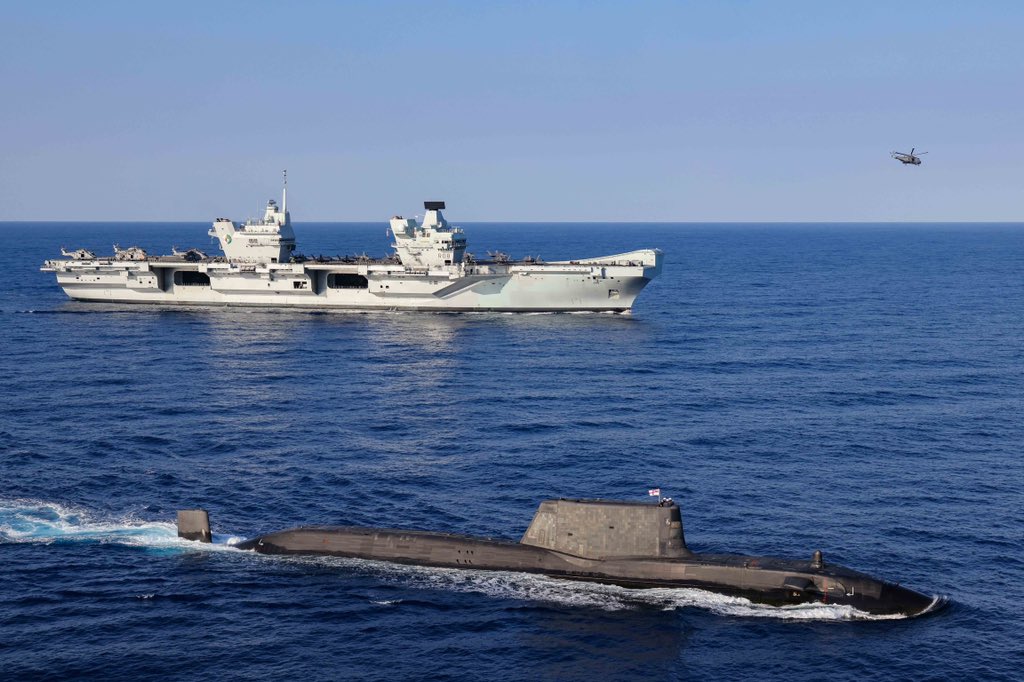Britain ‘Not Immune’ to the Impact of Global Order Instability — British Chief of Staff
United Kingdom’s Chief of Defence Staff, Admiral Sir Tony Radakin outlined a world divided into three categories: authoritarian states challenging international rules, responsible nations committed to stability, and countries hedging between the two for strategic advantage.
(DEFENCE SECURITY ASIA) – The United Kingdom’s Chief of Defence Staff, Admiral Sir Tony Radakin, delivered a stark warning about the threats to the nation’s sovereignty and infrastructure during his annual address at the Royal United Services Institute (RUSI).
While Britain may feel more secure than countries like Ukraine or Poland, Radakin stressed that the nation is not immune to the repercussions of an increasingly unstable global order.
He outlined a world divided into three categories: authoritarian states challenging international rules, responsible nations committed to stability, and countries hedging between the two for strategic advantage.
Radakin identified Russia, China, North Korea, and Iran as destabilizing actors, each pursuing their own agendas at the expense of global norms.
The Russian invasion of Ukraine, China’s efforts to reshape international rules to its benefit, and destabilizing actions by nations like Iran and North Korea to maintain their regimes underscore the challenges to global security.
Radakin emphasized that concepts such as sovereignty, deterrence, and freedom of navigation have tangible implications, especially in regions under direct threat.

Brief:
Admiral Sir Tony Radakin, the United Kingdom’s Chief of Defence Staff, has highlighted growing threats to British sovereignty and infrastructure amid an increasingly unstable global order. Speaking at the Royal United Services Institute (RUSI), Radakin warned that despite feeling relatively secure compared to nations like Ukraine, Britain is not immune to global instability.
He categorized global dynamics into three groups: authoritarian states challenging international norms, responsible nations supporting stability, and those exploiting the divide for advantage. Radakin identified Russia, China, North Korea, and Iran as key disruptors, citing their destabilizing actions, including Russia’s invasion of Ukraine and China’s manipulation of global rules.
He stressed that abstract principles like sovereignty, deterrence, and freedom of navigation have real-world consequences, such as the impact of Russia’s actions on global food security and Iranian missile threats to merchant ships.
Despite its geographical advantage and NATO backing, Britain faces growing risks, including rising cyberattacks, foreign interference in critical infrastructure, and a Europe-wide campaign of sabotage. These challenges have tangible effects on citizens, from economic stagnation to energy costs.
Radakin urged vigilance and adaptability, emphasizing the need to navigate a contested and dangerous security landscape.
“The concept of sovereignty is a reality for the people of Ukraine, who are paying an extraordinary price to defend it,” he stated.
He highlighted the far-reaching consequences of Russia’s actions in the Black Sea on global food security and the threats posed to merchant ships in the Red Sea by Iranian-supplied missiles, illustrating how instability transcends conflict zones.
Despite its geographical advantage as an island nation and the strength of NATO, Radakin warned that Britain is not insulated from global instability.
“Our national airspace, territorial waters, critical energy and digital infrastructure, and public discourse have all been subject to interference,” he said.

The frequency of cyberattacks targeting British networks continues to rise, driven by rogue actors and hostile states. Radakin also pointed to a campaign of arson and sabotage across Europe, described by intelligence chiefs as “a sustained mission to create chaos” and “beyond irresponsible.”
The ripple effects of global instability are felt in the daily lives of British citizens, impacting the cost of living, energy subsidies, and economic stagnation as markets react to uncertainty.
“The security landscape is now more contested, ambiguous, and dangerous than at any point in our careers,” Radakin concluded, calling for vigilance and adaptability in navigating these complex challenges. — DSA


